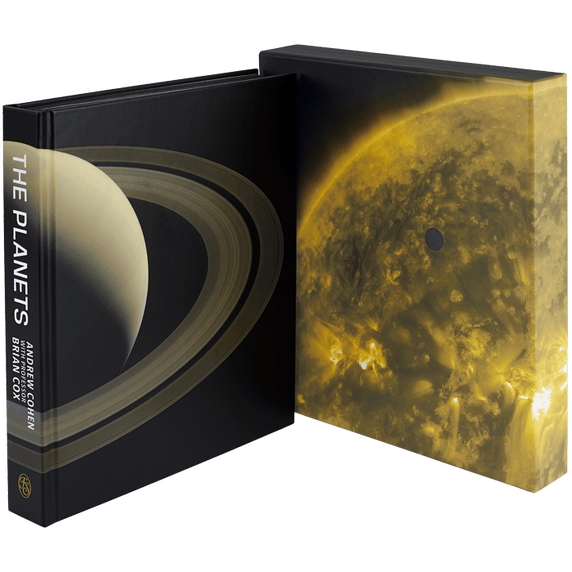
The Planets
The Planets is a thrilling tour of our solar system by Andrew Cohen and Professor Brian Cox, in a Folio edition with breathtaking NASA photography from the latest space missions.
Introduced by A. C. Grayling
Picture selection by William Bynum Limited to 500 hand-numbered copies
The book that revolutionised our view of life on earth more than any other, Charles Darwin’s On the Origin of Species, is presented in a fabulous Folio Society limited edition of 500 numbered copies; half-bound in leather with hand-marbled paper sides.
Man selects only for his own good; Nature only for that of the being which she tends.
In the book that changed our view of life on earth, Charles Darwin challenged the place of the human race at the centre of creation and started a scientific revolution. Evolution by natural selection had been discussed in academic works, but Darwin’s energetic prose was written to be read and understood by the general public and led to its author being described as ‘the most dangerous man in England’.
Half-bound in goatskin leather blocked in gold foil with lettering and ornaments by Jamie Clarke, and with hand-marbled paper sides by Jemma Lewis, this edition is worthy of the best collections. A. C. Grayling’s insightful introduction and Darwin expert William Bynum’s inspired selection of 40 pages of plates illuminate the text, that of the first edition from 1859. Charles Darwin’s book for ever altered the history of mankind and, in highlighting the synergy between life forms and environment, was a pioneer work of ecology – ever more important in our world today.
An edition that is not limited of On the Origin of Species is available here.
Limited to 500 hand-numbered copies
Half-bound in goatskin leather blocked in gold foil with lettering and ornaments by Jamie Clarke
Marbled paper sides by Jemma Lewis
Set in Garamond with Victoria Titling as display
448 pages of text printed on Munken Pure paper
Frontispiece and 40 pages of plates printed on Symbol Tatami paper
Gilded page tops and fore-edges
Ribbon marker
Cloth-covered slipcase blocked in gold foil with lettering and ornaments by Jamie Clarke
11½˝ x 8˝
‘The remarkable feature of On the Origin of Species … is that it is not only a classic of science but a classic of literature.’
- A. C. Grayling, from his introduction
The theory of evolution was already well known in the 1850s, when Darwin was writing; it was the theory of natural selection that was groundbreaking. Following his five-year voyage as a natural scientist aboard the Beagle, Darwin reached the conclusion that the different species had not been created by God as described in Genesis, but rather that life, once begun, developed in all its glorious diversity through a process of gradual change forced by the struggle for existence. Anxious about the impact of his ideas, Darwin did not reveal his work for almost 20 years, until he learnt that Alfred Russel Wallace’s research had led him to similar conclusions. Close friends urged Darwin to publish and so, six months after papers by both men were jointly presented to the Linnean Society on 1 July 1858, the first edition of On the Origin of Species was launched – selling out on the day of publication.
The book which explores one of the most important ideas of the last 200 years, namely the story of life on earth, is paired perfectly with introducer A. C. Grayling – a philosopher who has worked on the history of ideas and who appreciates Origin both as great science and as great literature. And to illuminate this extraordinary book further, Darwin expert William Bynum has closely matched more than 40 fabulous images to the text, describing each one in fascinating captions. Jemma Lewis was chosen to hand-marble the paper sides, ensuring that every book is unique. She based the colours of her designs on the plumage of the birds and the iridescent beetles’ wings in the pictures Bynum selected to complete this superb limited edition.

